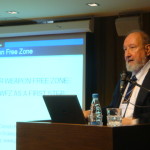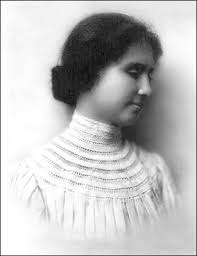We Need Their Voices Today! (21) Helen Keller
TRANSCEND MEMBERS, 13 Nov 2017
John Scales Avery, Ph.D. – TRANSCEND Media Service
Introduction
This is a collection of biographical sketches showing people whose wise voices from the past can help to guide us today. All of the women and men, brief glimpses of whose lives and ideas are portrayed here, gave a high place to compassion. None of them was a slave to greed. We need their voices today!
[Note from TMS editor: It will be posted one biographical sketch per week]
**********************************************
Annie Sullivan Becomes Helen’s Teacher
Helen Keller was born in 1880, in Tuscumbia, Alabama. Her father had served as a captain in the Confederate Army during the American Civil War, and her mother, Kate Adams, was the daughter of a Confederate general. She was also related to Robert E. Lee, so by birth she was certainly a Southerner. Today Helen Keller Day is celebrated each year in Alabama following a 1980 proclamation by President Jimmy Carter.
Helen was a normal child until the age of 19 months, when she contracted an illness which may have been scarlet fever or meningitis. It left her both deaf and blind. When Helen was 6 years old, her parents followed the advice of Alexander Graham Bell and contacted the Perkins Institute for the Blind. The Perkins Institute recommended their recent graduate Annie Sullivan, who became Helen’s teacher.
Annie Sullivan, who was 20 years old at that time and also blind, began to work with Helen, spelling out words on the palm of Helen’s hand. This method was unsuccessful at first, but one day, when Annie Sullivan was spelling out “water” on one of Helen’s hands while water was running over the other, Helen suddenly realized that the letters were a symbol for water. For the next many days, the child almost wore her teacher out by demanding the spelling of hundreds of other things within her experience. Annie Sullivan later became Helen’s lifelong friend and companion.
Victory over a Triple Handicap
Starting in 1888, Helen Keller began her formal education, at first at the Perkins Institute, then at a succession of other schools. Finally, at the age of 24, with financial help from a wealthy friend of Mark Twain. Helen graduated from Radcliffe College. She was the first blind and deaf person to obtain a BA degree. On the way to this triumph, Helen had taught herself to speak normally, and she could understand what other people were saying by placing her hand on their lips.
Helen Keller quickly developed into a popular lecturer and author. She spoke and wrote to advocate many social reforms, including woman’s suffrage, labour rights, socialism and antimilitarism.
The story of Helen Keller and Annie Sullivan, as told in Helen’s “Autobiography”, became known to a very wide public through the drama “The Miracle Worker”, which was first produced as a radio broadcast, then as a television drams, then as a Broadway play and finally as a succession of films.
Here is a newspaper account of one of Helen Keller’s lectures:
“The wonderful girl who has so brilliantly triumphed over the triple afflictions of blindness, dumbness and deafness, gave a talk with her own lips on `Happiness,’ and it will be remembered always as a piece of inspired teaching by those who heard it.
“According to those who attended, Helen Keller spoke of the joy that life gave her. She was thankful for the faculties and abilities that she did possess and stated that the most productive pleasures she had were curiosity and imagination. Keller also spoke of the joy of service and the happiness that came from doing things for others … Keller imparted that `helping your fellow men were one’s only excuse for being in this world and in the doing of things to help one’s fellows lay the secret of lasting happiness.’ She also told of the joys of loving work and accomplishment and the happiness of achievement. Although the entire lecture lasted only a little over an hour, the lecture had a profound impact on the audience.”
A Few Things That Helen Keller Said:
“Strike against war, for without you no battles can be fought! Strike against manufacturing shrapnel and gas bombs and all other tools of murder! Strike against preparedness that means death and misery to millions of human beings! Be not dumb, obedient slaves in an army of destruction! Be heroes in an army of construction
“Strike against war, for without you no battles can be fought! Strike against manufacturing shrapnel and gas bombs and all other tools of murder! Strike against preparedness that means death and misery to millions of human beings! Be not dumb, obedient slaves in an army of destruction! Be heroes in an army of construction
“Strike against war, for without you no battles can be fought! Strike against manufacturing shrapnel and gas bombs and all other tools of murder! Strike against preparedness that means death and misery to millions of human beings! Be not dumb, obedient slaves in an army of destruction! Be heroes in an army of construction.”
“The best and most beautiful things in the world cannot be seen or even touched – they must be felt with the heart.”
”Believe. No pessimist ever discovered the secrets of the stars or sailed to an uncharted land or opened a new heaven to the human spirit.”
”Alone we can do so little. Together we can do so much!”
“It is for us to pray not for tasks equal to our powers, but for powers equal to our tasks, to go forward with a great desire forever beating at the door of our hearts as we travel toward our distant goal.”
“To keep our faces toward change, and behave like free spirits in the presence of fate, is strength undefeatable.”
“Self-pity is our worst enemy and if we yield to it, we can never do anything wise in the world.”
“Security is mostly a superstition. It does not exist in nature, nor do the children of men as a whole experience it. Avoiding danger is no safer in the long run than outright exposure. Life is either a daring adventure or nothing.”
“I do not want the peace that passeth understanding. I want the understanding which bringeth peace.”
Helen Keller, who although deaf and blind, could see injustice clearly, who could hear the voices of victims of war, and who spoke eloquently for social reform, we need your voice today!
Contents:
21 Helen Keller
22 We need their voices, and yours!
________________________________________________
 John Scales Avery, Ph.D., who was part of a group that shared the 1995 Nobel Peace Prize for their work in organizing the Pugwash Conferences on Science and World Affairs, is a member of the TRANSCEND Network and Associate Professor Emeritus at the H.C. Ørsted Institute, University of Copenhagen, Denmark. He is chairman of both the Danish National Pugwash Group and the Danish Peace Academy and received his training in theoretical physics and theoretical chemistry at M.I.T., the University of Chicago and the University of London. He is the author of numerous books and articles both on scientific topics and on broader social questions. His most recent books are Information Theory and Evolution and Civilization’s Crisis in the 21st Century (pdf).
John Scales Avery, Ph.D., who was part of a group that shared the 1995 Nobel Peace Prize for their work in organizing the Pugwash Conferences on Science and World Affairs, is a member of the TRANSCEND Network and Associate Professor Emeritus at the H.C. Ørsted Institute, University of Copenhagen, Denmark. He is chairman of both the Danish National Pugwash Group and the Danish Peace Academy and received his training in theoretical physics and theoretical chemistry at M.I.T., the University of Chicago and the University of London. He is the author of numerous books and articles both on scientific topics and on broader social questions. His most recent books are Information Theory and Evolution and Civilization’s Crisis in the 21st Century (pdf).
This article originally appeared on Transcend Media Service (TMS) on 13 Nov 2017.
Anticopyright: Editorials and articles originated on TMS may be freely reprinted, disseminated, translated and used as background material, provided an acknowledgement and link to the source, TMS: We Need Their Voices Today! (21) Helen Keller, is included. Thank you.
If you enjoyed this article, please donate to TMS to join the growing list of TMS Supporters.

This work is licensed under a CC BY-NC 4.0 License.

